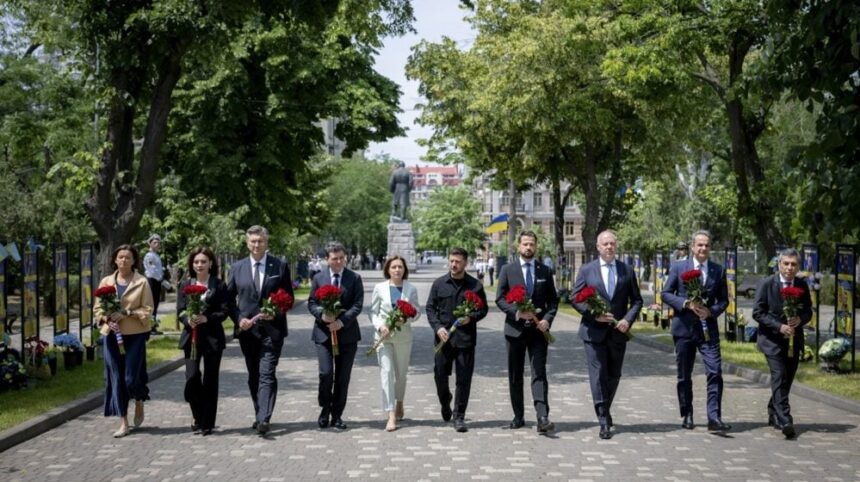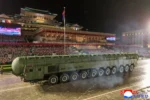In a declaration adopted yesterday at the fourth Ukraine-Southeast Europe Summit in Odesa, participating countries called on the international community to intensify support for Ukraine and strengthen sanctions against Russia in the banking and energy sectors.
The document, not signed by Serbian President Aleksandar Vučić among the 11 summit participants, urges the international community to increase support for Ukraine “in its fight to defend freedom, independence, and territorial integrity.” It also calls on all states “to refrain from providing any material or other assistance to Russia’s war efforts.”
Calls for Accountability and Sanctions
The 19-point declaration encourages the international community to “maintain and further strengthen sanctions against Russia in the banking and energy sectors, especially regarding oil price caps and Russia’s ‘shadow fleet,’ to deprive the aggressor of the resources needed to continue its aggression against Ukraine, as well as to take measures to prevent circumvention of sanctions.”
“Russia must be held accountable and pay full compensation for the illegal war of aggression against Ukraine. Russian assets in all possible forms play a constructive role in Ukraine’s recovery in accordance with the provisions of international law,” the document states.
The declaration “most strongly condemns Russia’s brutal war against Ukraine,” describing it as a “grave crime against the Ukrainian people, a clear violation of international law, and a serious threat to peace, security, and stability across the wider European continent and globally.”
Unwavering Support for Ukraine’s Sovereignty
Signatories reaffirmed “unwavering support for Ukraine’s independence, sovereignty, and territorial integrity within its internationally recognized borders, including territorial waters.” They also reiterated their commitment to providing “comprehenzive and sustainable support to Ukraine and its people for as long as necessary.”
As “indispensable and non-negotiable conditions for a comprehensive, strong, and lasting peace,” the declaration lists “the full withdrawal of Russian forces and equipment from all Ukrainian territory, the cessation of hostilities and the war as a whole, and the complete restoration of Ukraine’s internationally recognized borders.”
The declaration also condemns “war crimes and crimes against humanity committed by Russian armed forces and other military formations in and against Ukraine,” including “deliberate, disproportionate, and indiscriminate armed attacks and drone and missile attacks on Ukraine’s civilian population and critical civilian infrastructure, as well as the forced deportation of thousands of Ukrainian civilians — including children — from temporarily occupied territories of Ukraine to Russia.”
Signatories reiterated “the importance of effective and independent investigations of Russian war crimes against Ukrainians and other crimes committed in and against Ukraine and bringing perpetrators to justice.” Additionally, they support “international efforts to establish a special tribunal for the crime of aggression against Ukraine, committed by Russia.”
Recovery Efforts and Past Summits
The document was signed by Ukrainian President Volodymyr Zelenskyy, Montenegrin President Jakov Milatović, Romanian President Nicușor Dan, Moldovan President Maia Sandu, Greek Prime Minister Kyriakos Mitsotakis, Croatian Prime Minister Andrej Plenković, Bulgarian Prime Minister Rosen Zhelyazkov, Albanian Parliament Speaker Elisa Spiropali, North Macedonian First Deputy Prime Minister Izet Mexhiti, and Slovenian Deputy Prime Minister Tanja Fajon.
The declaration notes that Ukrainian energy infrastructure “continues to suffer from deliberate and systematic attacks by Russia” and pledges to contribute to “the ongoing and post-war recovery and reconstruction of Ukraine.” It also emphasizes “the importance of improved regional coordination and strong electricity interconnectors to mitigate the impact of these attacks and strengthen regional energy security.”
The work of the Odesa Summit participants “builds upon the considerations and conclusions” of previous Ukraine-Southeast Europe summits held in Athens (August 2023), Tirana (February 2024), and Dubrovnik (October 2024).
Serbia’s Position
President Vučić, visiting Ukraine for the first time since the full-scale Russian invasion began in February 2022, told Serbian media that he did not sign the declaration because it calls for sanctions against Russia. He stated that “no one pressured him excessively” to sign and that he “could not go against himself, his country, and the policy it pursues,” which involves not imposing sanctions on Russia while respecting Ukraine’s territorial integrity.
Vučić also noted that President Zelenskyy “showed respect for Serbia’s territorial integrity” as there were no representatives from Kosovo at the Summit, adding that this was a “great gesture” towards Serbia that it “will certainly appreciate.”







